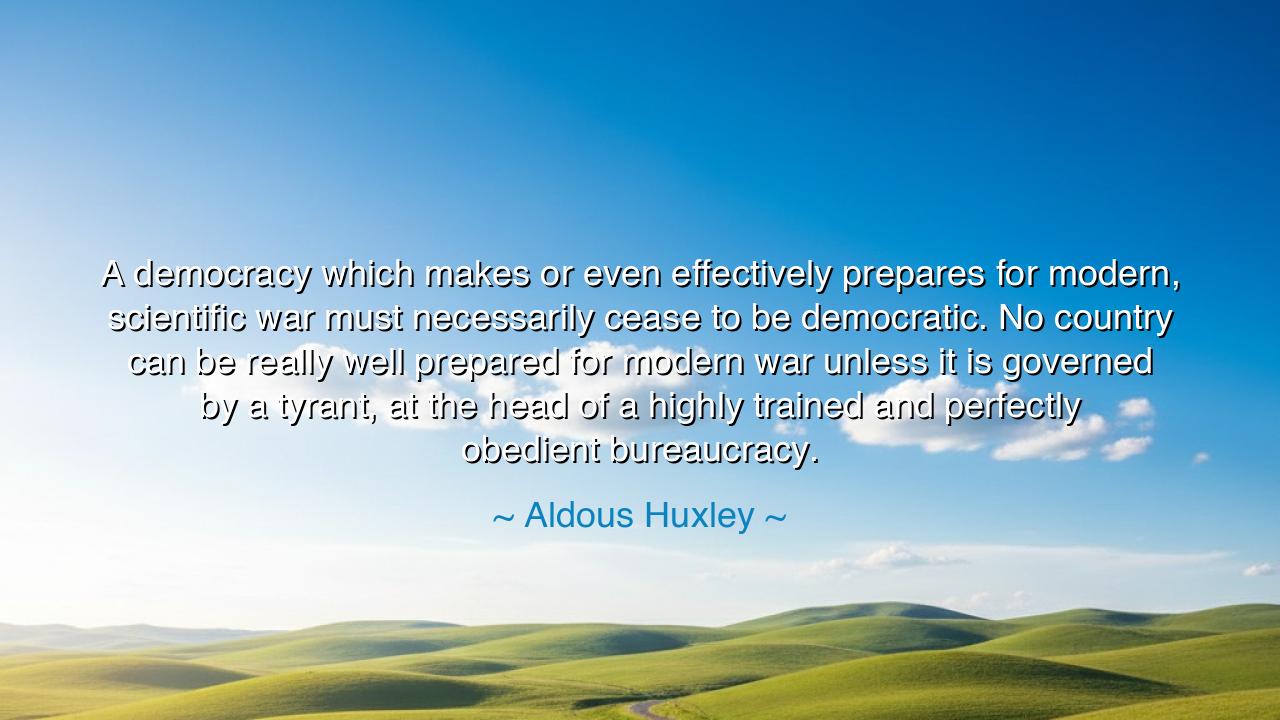
A democracy which makes or even effectively prepares for modern
A democracy which makes or even effectively prepares for modern, scientific war must necessarily cease to be democratic. No country can be really well prepared for modern war unless it is governed by a tyrant, at the head of a highly trained and perfectly obedient bureaucracy.






Aldous Huxley, prophet of the modern age and seer of freedom’s fragility, once declared with piercing foresight: “A democracy which makes or even effectively prepares for modern, scientific war must necessarily cease to be democratic. No country can be really well prepared for modern war unless it is governed by a tyrant, at the head of a highly trained and perfectly obedient bureaucracy.” These words, heavy with warning, remind us that war does not only kill bodies—it corrodes the very spirit of liberty. For the tools of modern, scientific war are so vast, so intricate, so consuming, that the freedoms of citizens must be sacrificed to sustain them.
The origin of this reflection lies in the first half of the twentieth century, an era when humanity saw the rise of mechanized slaughter in the trenches of the First World War, followed by the total mobilization of peoples and industries during the Second. Huxley, writing as a thinker deeply troubled by the marriage of science and authoritarian power, saw that to maintain readiness for such wars required not just weapons, but the regimentation of society. To build tanks, planes, and bombs in vast numbers, to train armies with precision, to direct all resources toward destruction—this required obedience, central control, and suppression of dissent. In short, it required the very opposite of democracy.
The meaning of Huxley’s words is thus a paradox: a democracy that arms itself too thoroughly against war risks destroying its own soul before the first shot is fired. Liberty thrives on debate, dissent, and diversity of thought. But war demands silence, obedience, and efficiency. When a nation devotes itself to preparation for scientific war, it inevitably builds the machinery of tyranny: secret police to silence critics, bureaucracies to command production, propaganda to control the masses. The enemy may lie across the border, but the true casualty becomes freedom itself.
History offers powerful examples. Consider Nazi Germany, a nation that embraced tyranny to prepare for war. Every aspect of life was regimented: children trained in youth organizations, factories conscripted for arms production, the press enslaved to propaganda, and dissent extinguished in terror. The result was a nation terrifyingly efficient in its march to war. Contrast this with Britain and the United States, democracies that, when forced into total war, also found themselves curtailing freedoms—rationing food, controlling industries, silencing certain speech, and even interning their own citizens, as Japanese-Americans were in the United States. Huxley’s point emerges clearly: democracy and total preparation for war cannot long coexist without one devouring the other.
We see echoes even in more recent times. The Cold War forced democratic nations to create vast military-industrial complexes, secret intelligence networks, and permanent states of vigilance. President Eisenhower himself warned of the danger when he spoke of the “military-industrial complex,” a machine that, once built, is hard to restrain. Democracies that prepare endlessly for war risk sliding into the shadows of surveillance, suspicion, and centralized control. The threat Huxley named did not end in his time—it continues into ours.
Yet within his warning lies also a call to courage. Huxley does not say that democracy must be weak, nor that it should ignore danger. Rather, he cautions that preparation for war must not consume the essence of liberty. A free people must guard their freedom even more fiercely in times of fear, resisting the temptation to surrender their voices for the illusion of safety. The tyrant may promise security, but the price he demands is obedience—and once paid, freedom seldom returns.
The lesson for us is this: let us resist the slow creep of militarization into the heart of our societies. Let us remain vigilant against those who would silence dissent in the name of security, or who would sacrifice liberty for efficiency. Let us remember that the strength of democracy lies not in perfect obedience, but in the free spirit of its citizens. To prepare for defense is wise, but to prepare so completely that we enslave ourselves is to hand victory to tyranny without a single battle fought.
Practical wisdom calls for balance. Support the defense of your nation, but question its excesses. Honor those who serve, but also guard the freedoms they fight to defend. When fear rises, cling even tighter to justice, transparency, and debate. For if we lose freedom in the name of preparing for war, then we have already lost more than any enemy could take.
Thus, let Huxley’s words endure as both warning and guide: democracy cannot thrive under the shadow of permanent war. Guard your liberties, even in the hour of danger, lest the tyrant rise within your own gates, cloaked in the language of protection. For in the end, it is not victory on the battlefield that defines a nation, but whether its people remain free in their hearts and in their homes.






AAdministratorAdministrator
Welcome, honored guests. Please leave a comment, we will respond soon